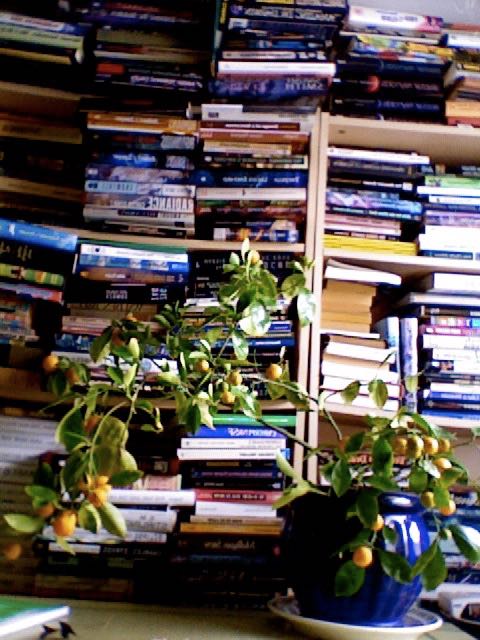
January 2008

30 January 08
" I am an orchard thief and the citizen of a green world ! Buss me, green maid ! " — Lud-in-the-Mist , p. 301.
Books at work (part of an ongoing series) :
Shelves of paperbacks, with winter orange tree, from [DN].
26-7 January 08
Lud-in-the-Mist (more)
I am utterly enchanted with Lud-in-the-Mist by Hope Mirrlees,
in particular the following passage in Chapter X, which moves from the quaint
to the astonishing :
Life has its sad side, and we must take the rough with the smooth. Why, maids have died on their marriage eve, or, what's worse bringing their first baby into the world, and the world’s wagged on all the same. Life’s sad enough, in all conscience, but there’s nothing to be frightened about in it or to turn one’s stomach. I was country bred, and as my old granny used to say, ‘ There’s no clock like the sun and no calendar like the stars. ’ And why ? Because it gets one used to the look of Time. There’s no bogey from over the hills that scares one like Time. But when one’s been used all one’s life to seeing him naked, as it were, instead of shut up in a clock, like he is in Lud, one learns that he is as quiet and peaceful as an old ox dragging the plough. And to watch Time teaches one to sing. They say the fruit from over the hills makes one sing. I’ve never tasted so much as a sherd of it, but for all that I can sing.
There certainly was something in the air and water in the British Isles in the mid-1920s, when this book, The King of Elfland’s Daughter by Lord Dunsany, and The Ship That Sailed to Mars by William Timlin were being written and published.
However, the paperback I am reading is so poorly produced — with so many scanning errors or indications that no human eye looked at it before going to print — that I find myself compelled to wait until I have seen the real thing before further comment (I almost stopped reading, but the lure of story was irresistible). This passage appears at pp. 135-6 in the original ; and now I have the pleasure of re-reading the book.
Other recent reading :
— Shadowland by Peter Straub (1980 ; Berkley paperback, 41st ptg). Complex and intertwined strains of narration over time, a real surprise. I was prompted to read it by John Clute’s essay on Straub for the Scribners Supernatural Fiction Writers .
— Stardust. Being a Romance within the Realms of Fairy by Neil Gaiman (Harper paperback, 2006). I liked this book enough to give it to a friend with high recommendation, and to search out its original form :
— Stardust. Being a Romance within the Realms of Fairy by Neil Gaiman, pictures by Charles Vess (4 parts, DC Comics, 1997-8). If this had appeared in the 1920s, it would be a classic as celebrated as The Ship That Sailed to Mars .
— Letitia Elizabeth Landon. A Biography by Frank Sypher (Scholars’ Facsimiles & Reprints, 2004). I had been meaning to learn more about L.E.L., popular poet and novelist of the early nineteenth century, after reading a brief account of her demise in The Grand Slave Emporium. Cape Coast Castle and the British Slave Trade by William St. Clair (2006).
— The Terror. A Novel by Dan Simmons (2007).
24 January 08
One year of the Endless Bookshelf
One year ago today the Endless Bookshelf migrated from a simple
list to its present creaking form. The frequency of posts charts
a pattern of initial activity declining
to erratic messages. I have received fewer electronic communications and pictures
than
expected ;
and the best source of new information remains old fashioned word of mouth and
friendship. Such as the following wonderful and curious book handed me by my
friend David R. Godine :

Portrait
of James Joyce from Men
of Letters and People of Substance by Roberto de Vicq de Cumptich
(David R. Godine,
2008).
At present I am reading a book frequently commended to me by Michael Swanwick
(— FINALLY ! — he will say) : Lud-in-the-Mist by
Hope Mirrlees (1926). I am delighted with the text, less than enchanted
with the modern paperback format in which I am experiencing the misadventures
of the Chanticleer family. I also wonder what the dust jacket for the original
edition looked like.
16 January 08
While reading Our Mutual Friend by Charles Dickens — rich
in characters, comical, and full of contrivance (blatant artifice
as opposed to the sudden revelation in Bleak House that the housekeeper of Chesney Wold is the mother of the compassionate shooting gallery owner suspected of murder, for which clues are planted) — one phrase stuck immediately in my head, "boofer lady",
used by the dying infant Johnny to describe Bella Wilfer (Bk. II,
chap. 9). I made a note, Dracula ?
And so when I passed a copy of Dracula on a bookshelf at the farm,
I picked it up, and sure enough, just before Jonathan Harker is bucked up by
learning that the whole thing is, indeed, true (in the bleakest, Clutean sense), there were the excerpts from the Westminster Gazette . . . . The Oxford World Classics edition note states simply that Stoker "stole" this device from Dickens. I would have stated "adopted" or "appropriated".
But what I see now, and did not grasp when I first read it as a teenager, is
that the book is doubly a horror novel : underlying the obvious post-gothic
claptrap of the plot is a reactionary view of the connection between blood and
sex and the idea of women as autonomous beings (references to polyandry in Lucy's
early letter and explicitly in Van Helsing's conversation with Seward after her
funeral). I remembered in broad what Mina Harker does to snare the Count, and
enjoyed a close reading of the second half of the novel. Just consider the gulf
in deportment and in self-awareness between the poor but honest Bella and Lucy
Westenra and how Stoker reveals himself alert to what was going on, even though
his response was uttermost reactionary.
12 January 08
Saw
my friend Ernest Hilbert on a New York City streetcorner yesterday.
More than most people I know, he lives and breathes poetry. He has
a new book, Sixty Sonnets , coming out later this year
from Red Hen Press. Just hours before running into Hilbert, I read
in Contemporary
Poetry Review (which he edits) an intelligent and appreciative
review of About the Size of It by Tom Disch (see the archive for May 07).
Lots of interesting books, new and old, in the past few weeks.
Michael
Swanwick's The Dragons of Babel (Tor, 2008) has claimed
my attention ever since Tuesday evening, publication day for the novel — Swanwick
read chapter four of the novel for the NYRSF Reading
Series at the South Street Seaport Museum.
The next post will report on a few others that I have read or re-read.
Unusual bookshelves

This creaking and constantly evolving blog of the endless bookshelf : I expect that some entries will be brief, others will take the form of more elaborate essays, and eventually I will become adept at incorporating photos or comments and interactivity. Right now you’ll have to send links to me, dear readers. [HW]
electronym : wessells
at aol dot com
Copyright © 2007 Henry
Wessells and individual contributors.
Produced by Temporary
Culture, P.O.B. 43072, Upper Montclair, NJ 07043 USA.
